Why are U2 the most polarising band in the world? The haters talk
FRONTMAN Bono wants to save the world as well entertaining it, which rubs people the wrong way. But why are U2 so polarising?
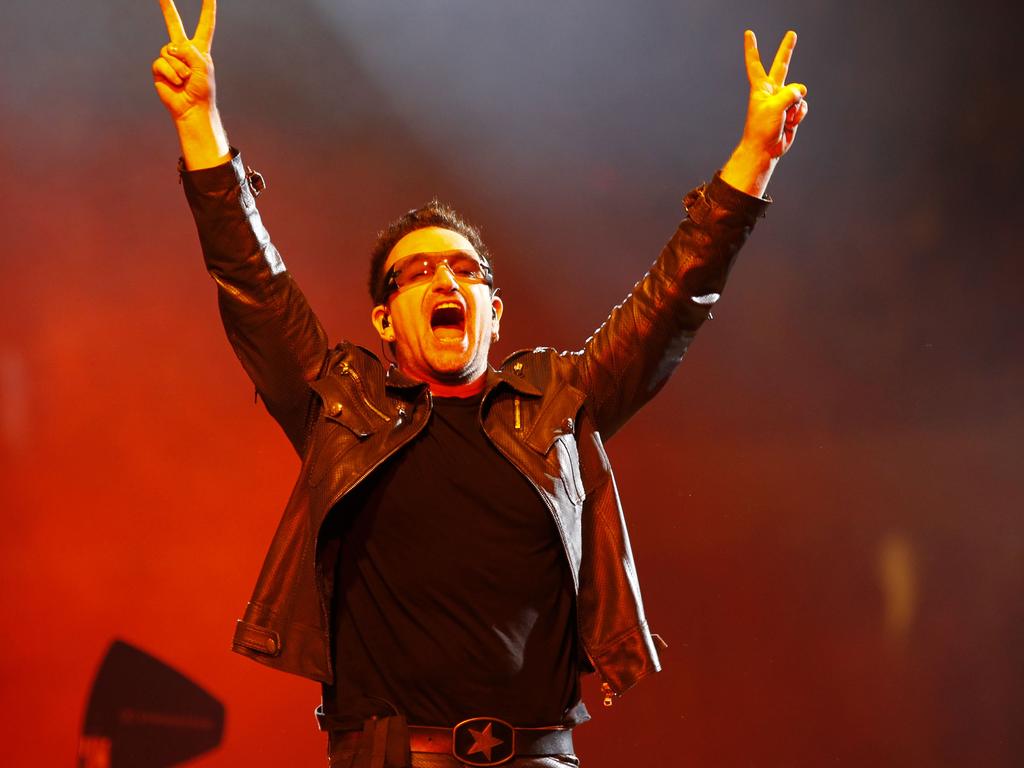
U2 may be the biggest band in the world, but are they also the most polarising?
A simple story published this week suggesting that their Joshua Tree 30th anniversary tour looks set to bypass Australia triggered a major backlash.
Not, as you’d expect, from upset U2 fans. They smartly went direct to the source — petitioning the band’s Facebook page. Bono’s already mentioned the band are “working on it.”
Rather it was from U2 haters, happy that their most loathed band wouldn’t be on Australian soil to play shows they’d never pay to see anyway. The haters got busy online calling Bono everything from “smug” to “pompous” — those being the more pleasant remarks.
One comment, calling U2 “the most overrated band in the history of music” got particular traction.
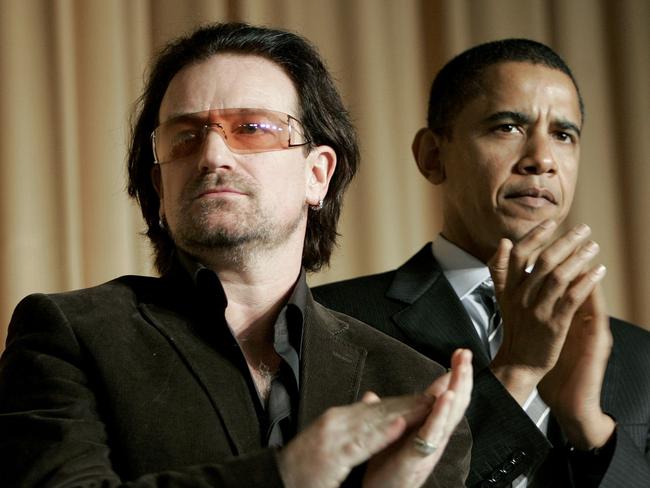
Its author, 3AW program producer Ken Francis, stands by his statement but admits U2 fans are easy to wind up.
“U2 are easily the most overrated band in history,” Francis says. “The fact they’re still the biggest band in the world says a lot about the calibre of bands that are around today. They’ve let the ‘holier than thou’ persona take over. They’re so overblown and pompous. The joke that started out about Bono thinking he was God has somehow materialised to be true. That’s the major problem — Bono needs to stop trying to save the world and get back to being a rock star. I think they’ve lost their way.”
Indeed, what is fuelling U2 haters is not so much the band’s music, which continues to be wildly successful, but Bono’s charity work which often crosses over into his job as a rock star.
Being outspoken and political is nothing new for Bono or U2. Their earliest hits were all politically-charged — 1983’s New Year’s Day is about the Polish solidarity movement, from that same year Sunday Bloody Sunday documents a deadly protest in Northern Ireland and 1984’s Pride, their first global hit, is about Martin Luther King and the civil rights movement in the USA.
After taking part in Band Aid and Live Aid in the mid ‘80s, Bono has spent subsequent decades fighting poverty, campaigning for third world debt relief and raising awareness of the AIDS pandemic in Africa.
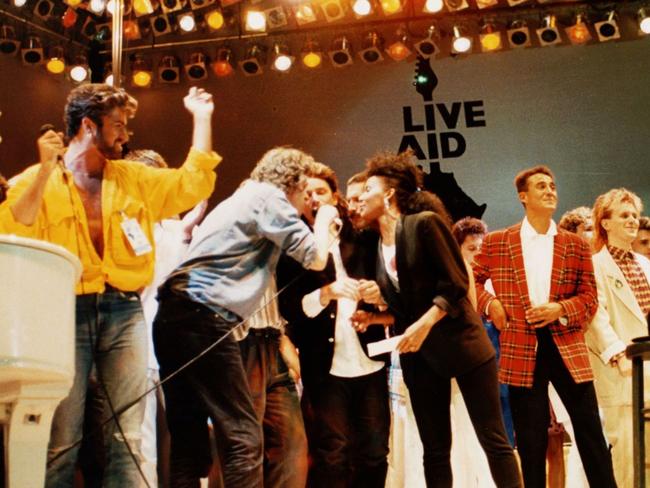
Bono has used his fame to draw the attention of both the media and world leaders and co-founded the ONE Campaign in 2004 to fight extreme poverty and preventable disease, particularly in Africa.
Some find it hard to reconcile Bono fighting for the world’s poorest with the fact his band continues to be one of the most lucrative in the world — their 2015 tour grossed $203 million from only 75 shows in the US and Europe. Their previous tour is the highest-grossing in history, topping $983 million when it ended in 2011.
Personally, his investment group Elevation Partners (named after a U2 hit) made nearly $2 billion when it bought a 2.3 per cent share (worth around $100 million in 2009) in a nascent company by the name of Facebook. As one of five partners, Bono’s cut came in around $60 million. His wealth puts him behind only Paul McCartney and Madonna on the list of the world’s richest musicians.
“People really used to love U2 when what Bono was saying was all about them,” says Paul Cashmere of music website Noise 11.
“But in this age where you get to see the full life of a celebrity, Bono has crossed from being a musician to an investment banker. The tipping point was probably his company making billions from the Facebook deal. The general public struggle to believe the words a multi-millionaire is saying about saving the world when he’s so blatantly filling his own coffers.
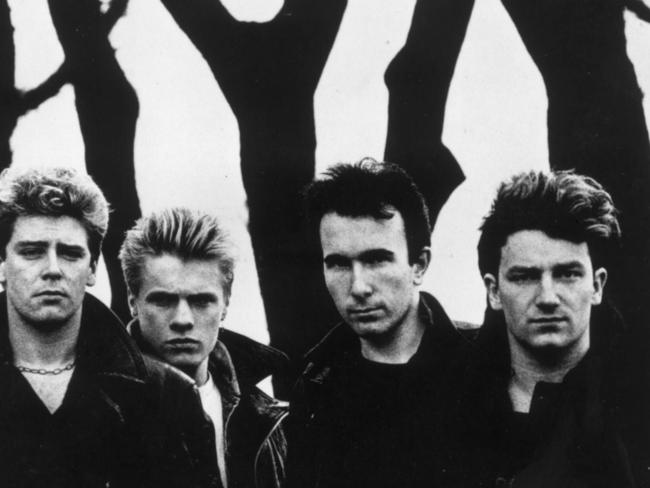
“In the ‘80s Bono was getting involved in political causes, but that was more speaking out about the establishment. Now he’s become very much part of the establishment, with his billion-dollar investments. There’s absolutely nothing wrong with being successful in a capitalist society. But from the public’s point of view it’s the same thing that translates to why Hillary Clinton didn’t win the US election — even though she was part of the better party to look after the people, the people didn’t trust them. And they don’t trust Bono.
“Bono is perceived as greedy. The band has a negative perception problem that overrides the music. When you have a perception problem it festers into this gigantic image of who you are.”
Naomi Dinnen is a lifelong U2 fan who wrote a book on the Irish band and the religious impulse to be published by Bloomsbury Academic Press this year.
She can understand why U2 are so polarising.
“Music and fame can have that effect,” she says. “U2 have always suffered from that (backlash). All the band members have their own causes. I think they really do care about people and because they travel and see so much of what’s happening in the world first-hand they get involved. They are true global citizens.”
Dinnen, like many U2 fans, finds it hard to comprehend why Bono’s lifetime commitment to charity angers some people.
“Look at the ONE stats to see what he has done. The guy has a right to be considered a world leader. Forty years of dedicating your life to that is a huge commitment.
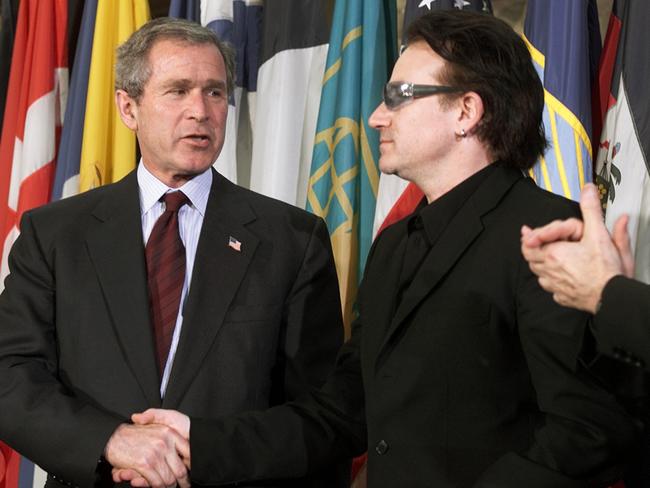
“There’s no way U2 are billionaires in it just for the money. To them it’s about what they can achieve as both musicians and social justice activists. They don’t need the money so why else would they still be doing it after 40 years?”
While it’s becoming ever easier to alienate fans in this increasingly conservative world, Bono is not the only superstar musician to lend his voice to causes. Yet, as Cashmere points out, no other artist seems to get the same level of grief for their charity work as does the U2 frontman.
“We know Bono is fabulously wealthy and he doesn’t have to do what he does, it’s quite admirable. Bruce Springsteen is probably as rich as Bono and also supports causes. But because Bruce hasn’t been waving the flag about saving the world he’s still perceived as America’s working class man, even though he’s filthy rich.
“Bono has done incredible good. What he’s done with his wealth has been morally quite sound, but particularly in the US right now people have an issue with other people getting rich while they’re getting poorer.”
There’s also the nagging issue of U2’s tax bills. When the band played Glastonbury in 2011, protesters turned up to criticise the four-piece moving some of their business affairs from Ireland to the Netherlands to take advantage of tax breaks.
Ahead of the festival that year, Bono argued being a businessman didn’t negate campaigning for a fairer world.
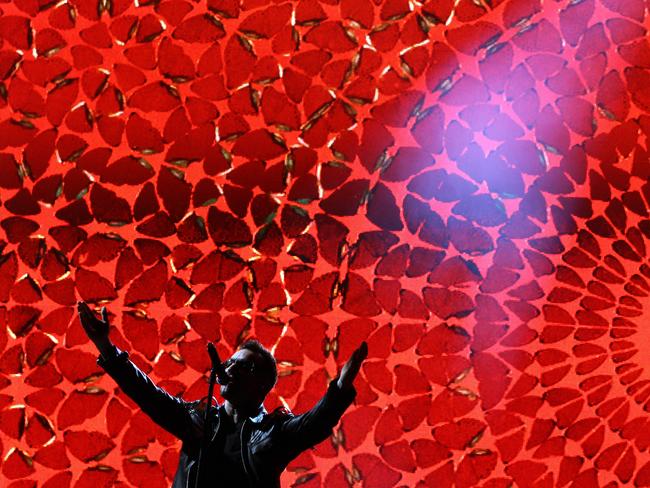
“It’s just some smart people we have working for us trying to be sensible about the way we’re taxed,” Bono said. “Just so people know, we pay a fortune in tax; and we’re happy to pay a fortune in tax, people should. But that doesn’t mean, because you’re good at philanthropy and because I’m an activist, people think you should be stupid in business and I don’t run with that.”
Sandro Olivo, who runs the U2 Australia fansite, says no one knows what the band may privately donate to charity. Besides, he adds: “Ask anyone if they’d like to pay less tax, what do you think the answer would be?”
Still, U2 haters will grab any chance to have a pot-shot. It came on a global level in 2014 when the band did a deal with Apple that saw their album Songs Of Innocence drop, uninvited, into the iTunes library of 500 million users worldwide.
The release fast became a PR disaster, especially in the age of social media, and led to the company inventing a function to delete the record.
“It wasn’t actually giving an album away,” Cashmere says. “They got paid a squillion dollars from Apple to put the album through their system that way. That pissed people off because they made a hell of a lot of money from a commercial deal with a multinational corporation and forced product on to people who didn’t necessarily want it. They should have given a free voucher people could redeem. It was a very bad PR move.
“There’s no one reason U2 are given a bad rap these days, but a lot of reasons stretching back 10 or 15 years.”
Olivio isn’t so sure.
“U2 fans got the album for free. I reckon they also picked up some new fans who listened to the songs and liked what they heard,” he says.

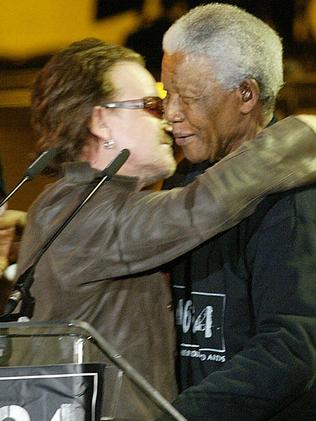
Music journalist and co-author of Molly Meldrum’s biographies, Jeff Jenkins, is “amused and perplexed” by the hate the band incites.
“It’s actually great they inspire such passion, it shows people still care about music,” Jenkins says.
“I couldn’t believe the Songs Of Innocence backlash. People were getting something for free and they were so angry. The world had gone crazy! The U2 haters have been around for a long time. Sure it’s easy to take shots at Bono. Unfortunately all the preaching probably overshadows one simple fact — Bono is such a great singer. If you need any proof of U2’s greatness have another listen to The Joshua Tree. Or give Beautiful Day a spin. Any band that can turn a line as trite as ‘It’s a beautiful day’ into something truly spectacular, well, that’s a great band.”
Michael Cavallaro has been playing the part of Bono in Melbourne cover band The U2 Show: Achtung Baby for 14 years.
“U2 definitely do polarise people,” he says. “That’s very evident online. It’s not the music, it’s Bono’s preaching. That’s the issue. He’s got a mouth and a lot of people don’t like it. In this day and age people don’t like to be told where they should donate their money or who they should vote for and with social media everyone can get their voice heard in a matter of minutes.
“I don’t get why people complain. He could be lying on a beach, but he’s always out there trying to make the world better. They’re one of the greatest bands in the world, especially at this point in time. The Rolling Stones and Bruce Springsteen never cop the same kind of flack. It’s disconcerting. You either love or hate U2, there doesn’t seem to be much middle ground.”
Olivo points out the band’s mammoth success — and remarkable longevity — is always going to rankle some.
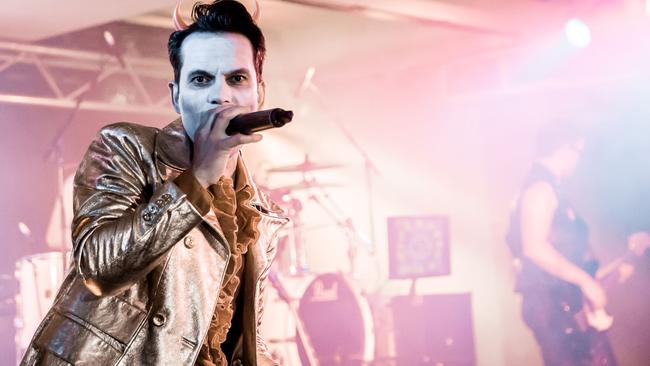
“From day one U2 wanted to be the biggest band in the world and they achieved it. Reaching the pinnacle of any industry will always attract negativity from some quarters. You tend to see more of the hatred through social media channels and that isn’t a true reflection of their popularity.
“In my view they are polarising because music is such an objective beast and U2’s music carries an emotional and political weight. Many people just want their bands to get up and entertain them. U2 does that, but it’s also a thinking person’s band. “
Bono would probably agree with those who label him smug, sanctimonious and pompous, according to Olivo.
“He’s said it himself. But the people who criticise Bono have a very superficial knowledge of who he is, where he’s come from and what he’s trying to achieve. My take on him is that he would be doing a lot behind the scenes but not wanting the publicity. But overtly, he’s trying to inspire the band’s fans to get involved and make the world a better place. After all, the fans vote at election time and can actually make a difference.”
On U2’s previous world tour, which bypassed Australia, Bono addressed his changing image during the band’s performance of the song Bullet the Blue Sky.
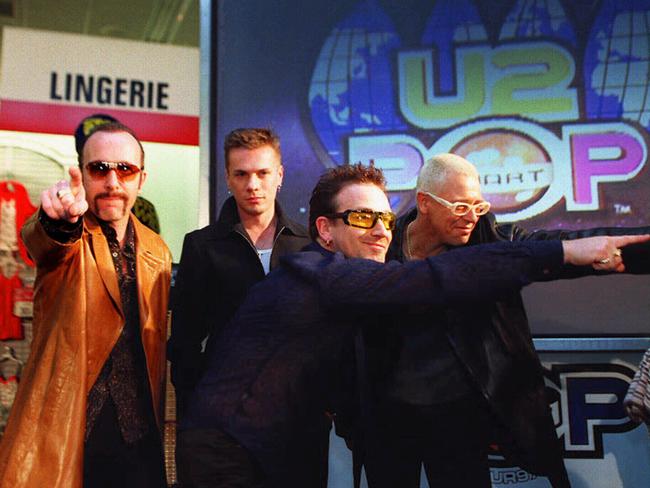
“He does a rant where the young Bono and old Bono interact,” Olivo explains. “The younger one chastises the elder for becoming a rich, spoiled rock star. He then explains he’s not afraid to put his neck out there and have his head chopped off by the haters if that get the masses motivated enough to effect change.”
U2 continue to be one of the few bands of their vintage whose new music is embraced, pushing boundaries with live performances that both cost and make a fortune.
“In terms of their legacy, that’s in place and can never be taken away,” Cashmere says. “But in terms of their future reputation, that’s something they have to do deal with on a year by year basis.”
Olivio isn’t concerned by any recent negativity changing the way U2 will ultimately be remembered.
“I don’t think the (bad) perception of the band has overshadowed the music or live shows. To me they are still a fantastic band. Of course I don’t like the negativity, but Nickelback and Coldplay suffer the same misfortune. They still play sellout shows though.”




